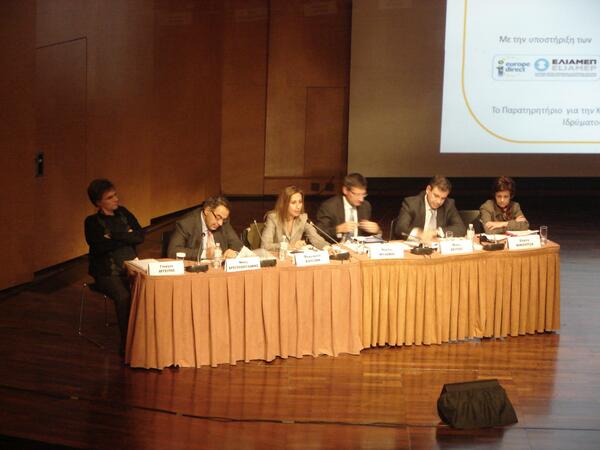Anastasia Balezdrova
The most serious problem in Greece after the severe recession is the high rate of unemployment. Experts however state that the problem had started earlier. As Daphne Nikolitsa, economist at the Economic Studies Department of the Bank of Greece, points out, the rate of unemployment, especially among young people, was high before the crisis too. According to her, this was primarily due to the high wages, which were disproportionate to the real economy, and to the lack of production companies, exporting their production abroad. "A large part of the workforce was employed in the commercial sector which had occurred as a result of the inappropriate economic model. Another factor was undeclared employment which, in turn, was due to the strict legislation and the obstacles that the state had itself put to entrepreneurs."
Daphne Nikolitsa states that, after the first attempts to liberalise the labour market, the removal of a number of bureaucratic obstacles and the gradual recovery of the economy, there has been a positive trend of reducing the rate of unemployment, albeit slow. "The figures for the first three quarters of 2013 show that the number of appointments was higher than that of dismissals, which is a positive sign." In her opinion, one important criterion for dealing with the problem is the fact that a large proprotion of the unemployed youth in Greece are highly qualified and they would make up the staff of companies with high demands.
She presented the data at the first annual conference of the Crisis Observatory at the Hellenic Foundation for European and Foreign Policy ELIAMEP.

"The economy requires investment to advance but the slow pace of reforms in Greece still prevents foreign investors from taking a big step and putting their capital into the country," states Nikos Betas, Director of the Foundation for Economic and Industrial Research IOVE and professor at Athens University of Economics.
He points out that the recovery programme applied in the country has not yet managed to achieve the most important thing, namely to change the structure of the economy, which has taken Greece to the brink. "I think that the lenders should have bound the aid to Greece with the implementation of the reforms without which the economy simply cannot recover." Nikos Betas states that the tax system should be reformed first followed by the public administration at all levels and the links between the public and private sectors. "Otherwise, all efforts will be in vain and the risk of the Greek economy being unable to exceed a growth rate of 1% for many years will be quite real."
In conclusion, he suggests that Greece should sign with its lenders a programme for forgiveness of part of the debt in return for which it would carry out all necessary reforms.
Pavlos Mylonas from the National Bank of Greece states that the banking sector is no longer a problem, expressing hope that market liquidity will start to gradually recover. "We had had a very serious problem with the outflow of deposits when the country had found itself on the brink of exiting the euro zone. According to various sources, the total amount drained from the banks in Greece was 100 billion euro. After the haircut of the debt, the money had started to return but the haircut of deposits in Cyprus this March has interrupted this process and it is now slower. The deposits will return when the confidence in banks is restored."
Pavlos Mylonas states that the Greek financial institutions are stable and have enough capital. "The report of BlackRock will be announced in the coming days and it will be positive for all banks in Greece," he said, adding that there are already strong signs of recovery of the Greek economy.
The conference was attended by two professors of economics, who did not share this optimistic view. According to George Argitis and Nikos Christodoulakis, who was Minister of Economy in the PASOK government (2000 - 2004), the recovery programme applied in Greece is about to completely destroy the economy. They state that, as a result of the measures, the foreign debt has increased and express doubts about the positive results expected in 2014.
According to Christodoulakis, three years after the signing of the first Memorandum of financial support the Greek economy shrank by 23%, the foreign debt increased from 125% to 179% of GDP and the rate of unemployment from 7% to 23%. "What is the reason for this? It is the excessive taxation of the same categories of taxpayers, the way of reforming the public sector, the recapitalisation of banks and the lack of privatisations."
According to him, the Greek parliament has to vote a law to oblige all subsequent governments to create a budget surplus, carry out real reforms, prepare a programme for state development, infrastructure and privatisation and reduce the debt by another 25% - 30% as the money, in his opinion, has been lost because of the recapitalisation of banks.